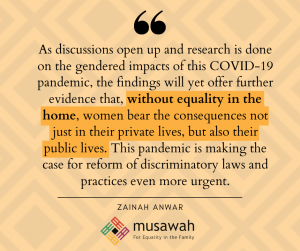2020 was supposed to be an auspicious year for gender equality. It’s Beijing+25, SDG+5, UN Security Council Resolution 1325+20. We in the women’s movement were planning launch events, critical reviews of progress, and new plans to accelerate action towards gender equality at the Commission on the Status of Women (CSW64), and Generation Equality in Mexico and Paris. We wanted to build a global momentum for the fact that equality can no longer wait.
Alas, the world has taken a different direction. The COVID-19 pandemic is taking over our daily lives and attention as each one of us deals with not just a health crisis, but also economic and social crises.
As Musawah moves forward to re-design the launch of our Campaign for Justice in Muslim Family Laws to online platforms, we are confronted with the stark reality of the gendered impacts of this global crisis. We are all supposed to stay at home – which means women’s unpaid care work multiplies, affecting the time needed to accomplish the deliverables of their paid work. We worry about reports of increased rates of domestic violence, a surge in calls to helplines, and, in some communities, a sudden silence when women can find no safe space to make the call for help. We also recognise that women make up the majority of health and social care workers; thus, in addition to caretaking families, they are at the forefront of the fight against COVID-19 in their communities and countries.
As discussions open up and research is done on the gendered impacts of this pandemic, the findings will yet offer further evidence that:
Without equality in the home, women bear the consequences not just in their private lives, but also their public lives. This pandemic is making the case for reform of discriminatory laws and practices even more urgent.
Zainah Anwar Tweet
It will be a challenge to make our voices heard when governments focus on mitigating the health and economic impact of this pandemic, yet again pushing aside women’s issues down the ladder of priorities. But equality and justice can no longer wait.
As we unroll our campaign throughout the year, we need to carve out the spaces needed to mobilise, to make the case for reform, to build public support for a world where there cannot be justice without equality in every sphere of life, not least in the home.
In solidarity with the people serving on the frontlines of this pandemic, and the women’s movements continuing to fight for invisibilised and silenced people, for more equal societies, and for the people simply trying to endure this new reality.
Resources and messages from our allies about COVID-19:
- IWRAW-AP: COVID-19: CAPITALISM’S MASK HAS SLIPPED
- APWLD: COVID-19 Highlights the Failure of Neoliberal Capitalism: We Need Feminist Global Solidarity
- SIHA Network:
- Horn of Africa: Coronavirus dos and don’ts are blind to urban poor women’s realities
- Somalia: Coronavirus dos and don’ts are blind to urban poor women’s realities in Somalia
- Somaliland: Make her visible: Coronavirus prevention advice is blind to the realities of the women of Somaliland’s informal economy
- South Sudan: How applicable are coronavirus dos and don’ts for women in prisons, IDP/POC camps, and urban poor communities in South Sudan?
- Sudan: Dos and don’ts: Coronavirus response advice does not see the reality of women in Sudan
- Uganda: Coronavirus: Uganda needs a robust response plan to support women in the informal economy
- BMMA: COVID-19 Demands by BMMA
- Sisters in Islam, Women’s Aid Organisation, and All Women’s Action Society in Malaysia: Covid-19: With ‘stay-at-home’ order enforced, domestic violence back on the rise in Malaysia
- Islamic Law Blog: COVID-19 global news roundup
- With and For Girls: COVID-19 and Girls’ Rights Series

